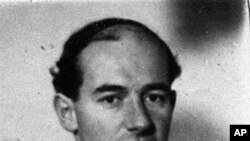“Raoul Wallenberg could have chosen to live a life of comfort and safety . . . during World War II,” U.S. Deputy Secretary of State William Burns said recently in Stockholm, Sweden on the 100th anniversary of Raoul Wallenberg's birth. “Instead, he risked his life to save the lives of others. Raoul Wallenberg paid dearly for his brave choice, and his actions speak to the core of our common humanity.”
Americans are deeply grateful that Wallenberg said ‘yes’ when the United States War Refugee Board approached him to go to Budapest to save the largest remaining concentration of Jews in Europe. Amid the many missteps in responding to the Holocaust, encouraging Wallenberg to go to Hungary was one that the United States did right.
Wallenberg’s actions show a timeless courage, and continue to exert a powerful and enduring relevance to the world. His actions embody the best of the democratic values. They also embody the courage of the individual, of the dissenter, of the independent moral conscience in a world full of wrongs, of the hero who sees injustice and takes action.
“Wallenberg gave his life for his commitment to those values,” the Deputy Secretary said. “Wallenberg was a son of Sweden . . . [The United States is] honored to consider him one of our own.”
It is worth noting that, while Wallenberg was trained as an architect, he left no building behind. Instead, Wallenberg left behind a legacy much more enduring than any physical structure. Today, the granddaughters and grandsons of those whom Wallenberg saved are building a better world as doctors and scientists, mothers and fathers, farmers, teachers, and legislators.
“Raoul Wallenberg’s life-giving legacy reminds us of question[s] that we should all be asking,” Deputy Secretary Burns continued. “How do we ensure that every individual – regardless of race or religion – is able to live a life of freedom, a life with dignity and respect? How do we prevent the sins of history and our past failures to stop mass killings of civilians from being repeated? How do we pass on to the next generation a sense of the importance of not being indifferent?”
“We remember Raoul Wallenberg,” Deputy Secretary Burns concluded. “And we reaffirm . . . the importance of not being indifferent.”
Honoring Raoul Wallenberg

Wallenberg’s actions show a timeless courage, and continue to exert a powerful and enduring relevance to the world.



